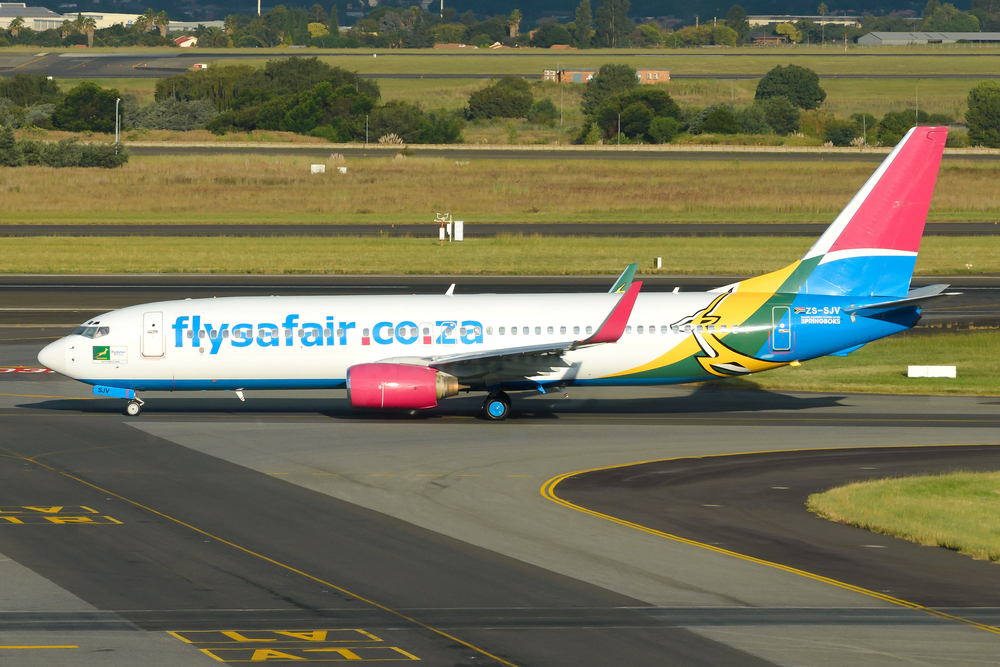South African low-cost airline FlySafair could be stripped of some of its most lucrative routes after regulators found that the carrier had violated rules pertaining to foreign ownership thresholds. Authorities in the country insist that 75% of voting rights in any air services licensees (airlines) are owned by South African residents and that the licensee must, in effect, be in control of the airline, its finances, and its operations.
The action began following a complaint by the owners of a fellow South African airline, Lift Airline, that cited anti-competitive practices and alleged non-compliance with the relevant provisions.
As an initial response to the investigation being carried out by the country’s Air Services Domestic Council and International Air Services Licensing Council, it is reported that FlySafair has appealed for an exemption to South African Minister for Transport Barbara Creecy as it contests the guilty verdicts handed down by the respective bodies. The breaches relate to the contravening of the foreign ownership threshold both in domestic and international markets.

The councils contend that 75% of FlySafair’s ownership is held in Ireland and Belgium rather than in South Africa, although the airline says the council is conflating the real picture of its ownership and control. However, any final ruling against the carrier could see it lose traffic rights and in the most severe case, it could lose its operating license and be grounded.
By applying to the Minister for Transport for an exemption, the airline is hoping to protect itself from possible sanctions, the most likely of which would be the withdrawal of traffic rights on some of the country’s most lucrative and busiest air connections. Such punishments, should they be imposed, would have the aim of both punishing the airline for the breaches, but also to allow the South African authorities to recoup the losses caused to the country by the airline’s prohibited practices over the years of allowing excessive foreign investment.
In its application, the airline stated that the council’s interpretation of the act was “highly unique and irregular in the context of global aviation, with almost no examples of similar legislation existing in other countries around the world.” However, aviation legal experts in the country have downplayed the prospects of success of the airline’s application, stating that FlySafair’s interpretation of the rules was flawed and that they are effectively putting their operation at risk by attempting to stall the process.
In speaking with local media outlets, FlySafair’s Chief Marketing Officer Kirby Gordon confirmed the airline had appealed for Transport Minister Barbara Creecy’s intervention by exempting them from any relevant legal provisions until its court application for a declaratory order and the court’s review of the council’s finding of non-compliance had been finalized.
“The request is currently being considered by the departmental legal services, taking into account the regulatory environment,” said a spokesperson on half of the Minister.
Any sanctions that may result at the end of this process could be severe. Despite the ownership of FlySafair having been under scrutiny by the regulators since 2022, the airline has reportedly taken little meaningful action to address the issue.
According to ch-aviation, FlySafair currently operates a fleet of 36 Boeing 737s on scheduled services on 23 routes, serving 14 destinations across five countries in Southern Africa from its base at Johannesburg OR Tambo International Airport (JNB). It is one of the leading carriers on the ‘Golden Triangle’ routes between Johannesburg, Durban, and Cape Town.
With a market share in the South African domestic market of around 60% and operating 160 flights carrying 30,000 passengers daily, any disruption imposed upon FlySafair and its operation would potentially disrupt the travel plans of thousands of passengers and could be disastrous for FlySafair itself. The airline has also warned that severe sanctions could disrupt the market and jeopardize the travel plans of thousands of passengers heading to the upcoming Coal Conference and Mining Indaba in Cape Town, which is expected to attract more than 10,000 international visitors.

